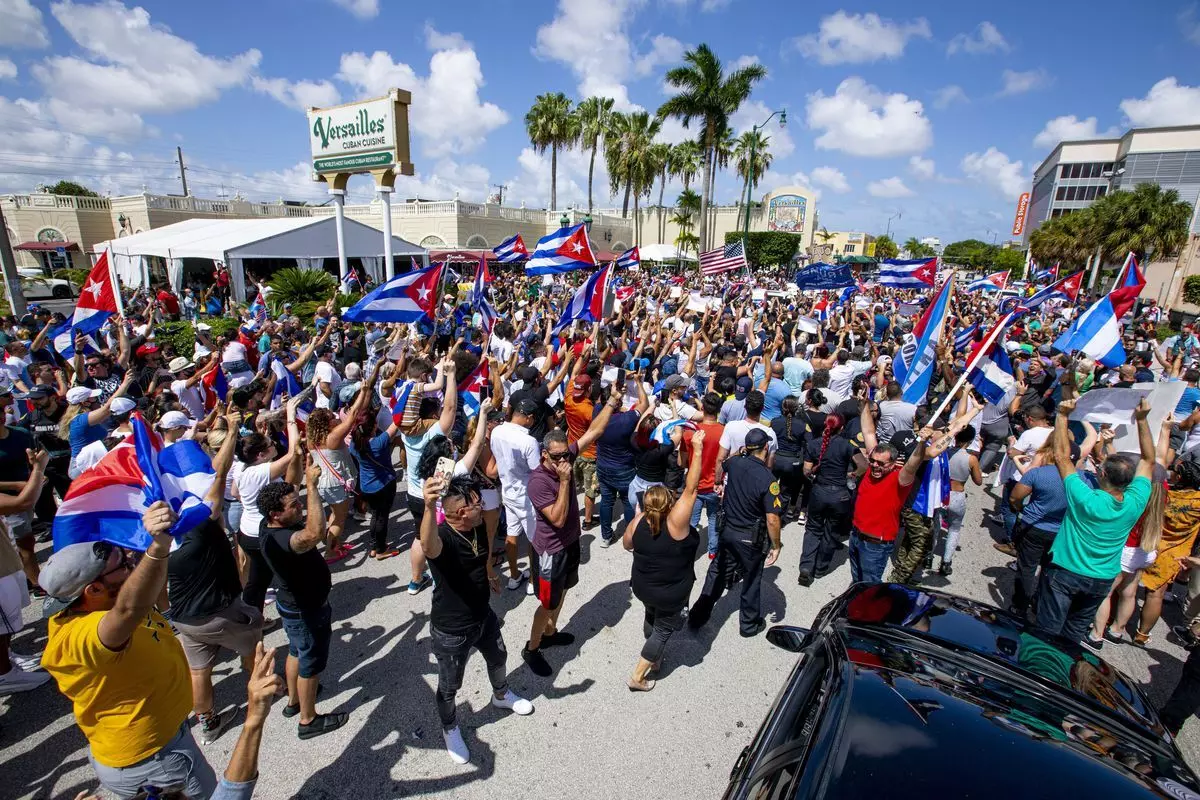
Cuban streets crammed with protestors demanding end of Communism
text_fieldsOn Sunday, July 11 2021, Cubans swarmed to the streets in protest, angry over the country's ongoing economic crisis and demanding the resignation of Cuban President Miguel Díaz-Canel and an end to communism in the country. Shortly after, President Miguel Díaz-Canel addressed the demonstrations, blaming the economic crisis in the country mainly on the U.S embargo i.e 'the blockade' on Cuba. But there's more to it.
First imposed in 1958, the United States embargo on Cuba restricted the sales of arms to the island nation. The embargo has since taken many forms. Currently, it restricts all forms of trade between the U.S and Cuba with the exception of food and humanitarian supplies.
The impact the decades-long embargo has had on Cuba is significant, and by no means should be discounted from the country's longstanding economic crisis. Criticisms have been levied against it time and again for affecting the food, medical, water and other economic needs of the Cuban population.
The Obama administration had relaxed some sanctions against Cuba, but this too was reversed during the Trump administration. Cuba was re-added to the U.S list of State Sponsors of Terrorism on January 12, 2021.
While current U.S President Joe Biden voiced support for the protestors, the United States of America and Israel were the only two countries that voted against the UN General Assembly's resolution in June to demand the end of the US economic blockade on Cuba. 184 countries voted in favour.
The embargo and its effects play a large role in the economic crisis Cuba is currently in, but it is not the sole cause of unrest in the country as President Díaz-Canel claims.
Cuba is one of four remaining Communist-run states in the world. While other Communist countries like Vietnam expanded their centralized economies for trade in the 1980s, Cuba was slow to bring about and implement these reforms. The country's Soviet-style economy and the communist regime have been heavily criticized for their negative impact on the Cuban economy as well as its population.
The communist regime in Cuba began after the 1959 revolution, led by Fidel Castro and other revolutionaries. Castro led the country till 2008 and was succeeded by his brother Raúl Castro in the same year. Fidel Castro died in the year 2016, and Raúl Castro retired in 2021. The Castro brothers— the two most revolutionary, influential figures of Cuba, are said to be largely the reason a communist regime has continued in Cuba for the last six decades. Now, in the absence of results, the people are calling for change.
Raúl Castro had introduced various economic reforms, but they were never fully implemented during his tenure. While President Díaz-Canel has begun to fast-track the implementation of these reforms, protesters opine that it's too little, too late.
The dissolution of the Soviet Union in 1991 also affected Cuba drastically. The country, which depended on the subsidies provided by its ally, the USSR, experienced extreme food and supply shortages after the latter collapsed. As a result, the Cuban economy is said to have shrunk by over 35%.
An economy that has continued to be in turmoil for decades only further deteriorated when Covid-19 hit. The Cuban government reported that the economy shrank by 11% in 2020, a culmination of the effects of the pandemic, the U.S embargo and other internal failures.
Cuba imposed strict guidelines to battle the pandemic in 2020, closing borders and shutting off tourism for 8 months. The uncompromising rules limited Covid-19 infections, but the economy suffered as a result. Hard currency, which Cuba needs to purchase goods, fell short, and the living conditions of the people worsened.
Mobile internet, still relatively new to the country, played the crucial role of a catalyst in mobilizing and organizing these unprecedented protests, the likes of which Cuba has not seen, or is quick to suppress, in the last six decades.
So what are the people of Cuba protesting against? By far, the momentum calls for an end to the Communist government. Thousands of demonstrators across the country are protesting against the prolonged economic crisis, the civil-liberty violations, the rampant food shortage and the substandard handling of the pandemic at the hands of the Cuban government.






















